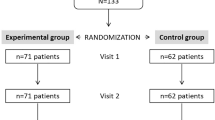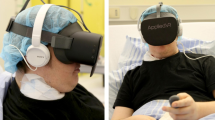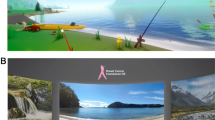Abstract
Background: The bedside wellness system (BSW) is effective for decreasing stress and improving mental well-being and should help relieve the side effects and mental disorders of patients during cancer chemotherapy. Methods: The study was a randomized clinical trial. After giving informed consent, patients were randomly assigned to the BSW intervention or control groups. The patients were given the Hospital Anxiety and Depression Scale (HADS) test before the trial to evaluate their emotional baseline. The Cancer Fatigue Scale, which was developed at our institute, and face visual analog scale were used to measure the emotional state and subjective feelings before and after the trial. The degree of emesis was measured using a visual analogue scale after the experience. We set up the system in a room in the outpatient clinic of the National Cancer Center New Hospital Building. Results: The decreases in the fatigue score and emesis score 3–5 days after chemotherapy were statistically significant (both p < 0.05) and carry-over effects were detected. Conclusions: BSW intervention therapy is an effective way to treat fatigue and emesis. This virtual reality system is a new therapeutic method that can be used in palliative medicine.
Similar content being viewed by others
REFERENCES
Oyama, H., Ohsuga, M., Tatsuno, Y., and Katsumata, N., Evaluation of the psycho-oncological effectiveness of the bedside wellness system. CyberPsychology & Behavior 2:81–4, 1999.
Ohsuga, M. et al., Bedside wellness — Development of a virtual forest rehabilitation system. Stud. Health Technol. Inform. 50:168–74, 1998.
Kugaya, A. et al., Screening for psychological distress in Japanese cancer patients. Jpn. J. Clin. Oncol. 28:333–8, 1998.
Okuyama T. et al., Development and validation of the cancer fatigue scale: a brief, three dimensional, self-rating scale for assessment of fatigue in cancer patients. J. Pain Symptom Manage. 2000 (in press).
Being and believing: ethics of virtual reality [editorial]. Lancet 338:283–4, 1991.
Carlin, A.S., Hoffman, H.G., and Weghorst, S. Virtual reality and tactile augmentation in the treatment of spider phobia: a case report. Behav. Res. Ther. 35:153–8, 1997.
Wiederhold, B.K., Davis, R. and Wiederhold, M.D. The effects of immersiveness on physiology. Stud. Health Technol. Inform. 58:52–60, 1998.
North, M.M., North, S.M., and Coble, J.R., Virtual reality therapy: an effective treatment for phobias. Stud. Health Technol Inform. 58:112–9, 1998.
North, M.M., North, S.M., and Coble, J.R., Virtual reality therapy: an effective treatment for psychological disorders. Stud Health Technol Inform 44:59–70, 1997.
Riva, G., Virtual reality as assessment tool in psychology. Stud. Health Technol. Inform. 44:71–9, 1997.
Bullinger, A.H., Roessler, A., and Mueller-Spahn, F. From toy to tool: the development of immersive virtual reality environments for psychotherapy of specific phobias. Stud. Health Technol. Inform. 58:103–11, 1998.
Derogatis, L.R. et al., A survey of psychotropic drug prescriptions in an oncology population. Cancer 44:1919–29, 1979.
Watson, M., Psychosocial intervention with cancer patients: a review. Psychol. Med. 13:839–46, 1983.
Sacerdote, P., The uses of hypnosis in cancer patients. Ann. NY Acad. Sci. 125:1011–9, 1966.
DuHamel, K.N., Redd, W.H., and Vickberg, S.M., Behavioral interventions in the diagnosis, treatment and rehabilitation of children with cancer. Acta Oncol. 38:719–34, 1999.
McGarvey, E.L., Canterbury, R.J., and Cohen, R.B., Evidence of acute stress disorder after diagnosis of cancer. South. Med. J. 91:864–6, 1998.
Derogatis, L.R. et al., The prevalence of psychiatric disorders among cancer patients. JAMA 249:751–7, 1983.
Author information
Authors and Affiliations
Rights and permissions
About this article
Cite this article
Oyama, H., Kaneda, M., Katsumata, N. et al. Using the Bedside Wellness System During Chemotherapy Decreases Fatigue and Emesis in Cancer Patients. Journal of Medical Systems 24, 173–182 (2000). https://doi.org/10.1023/A:1005591626518
Issue Date:
DOI: https://doi.org/10.1023/A:1005591626518




